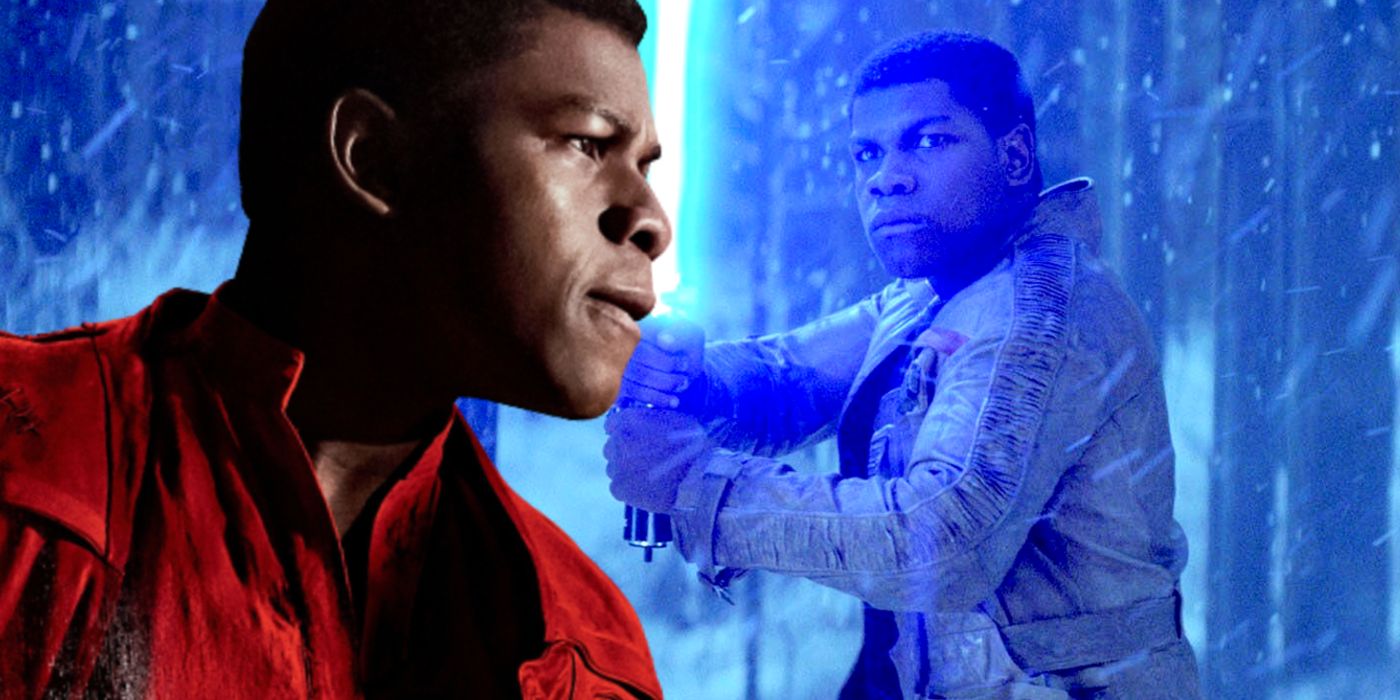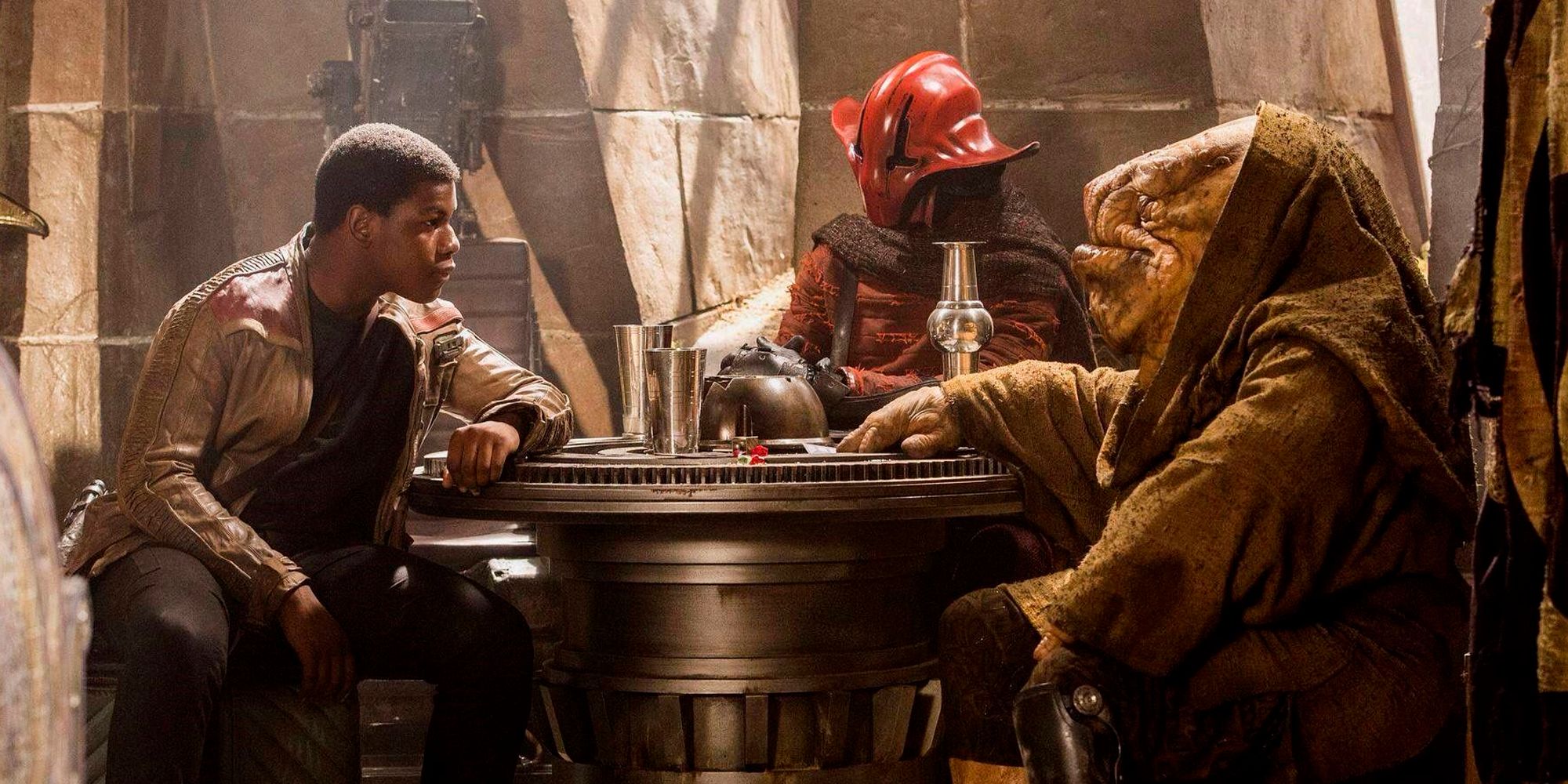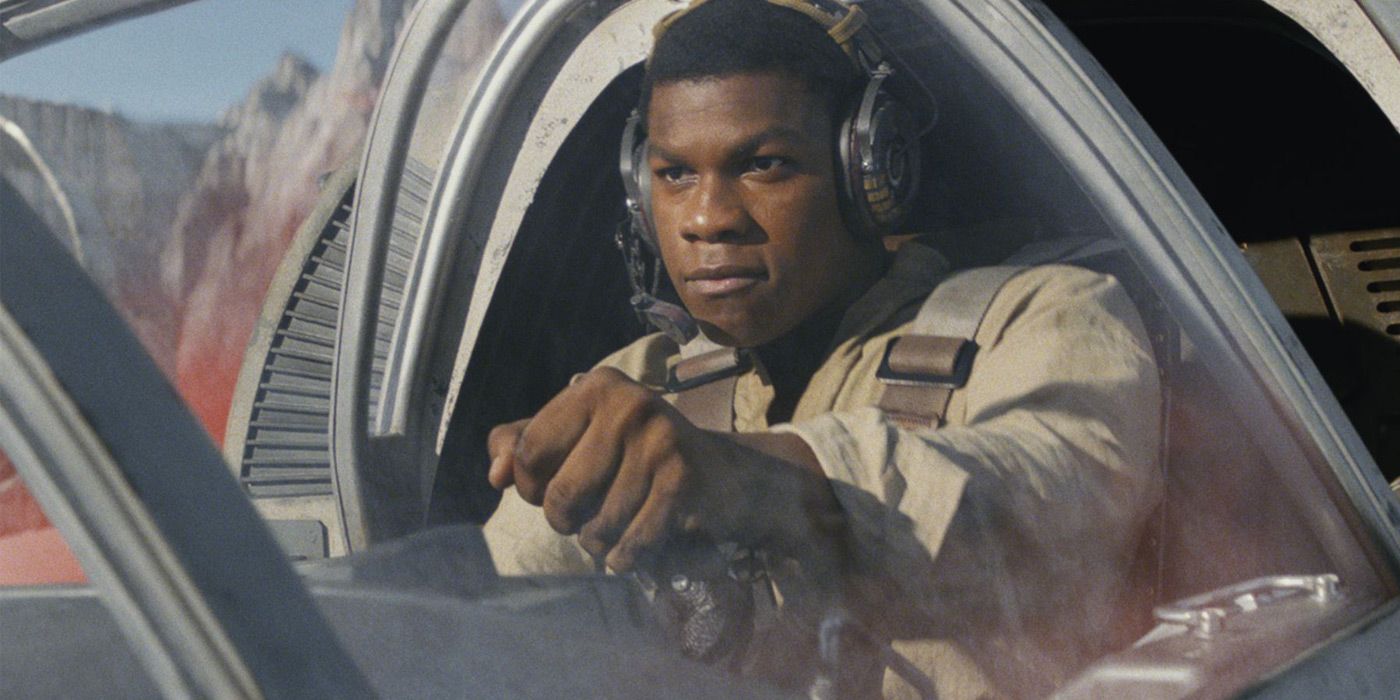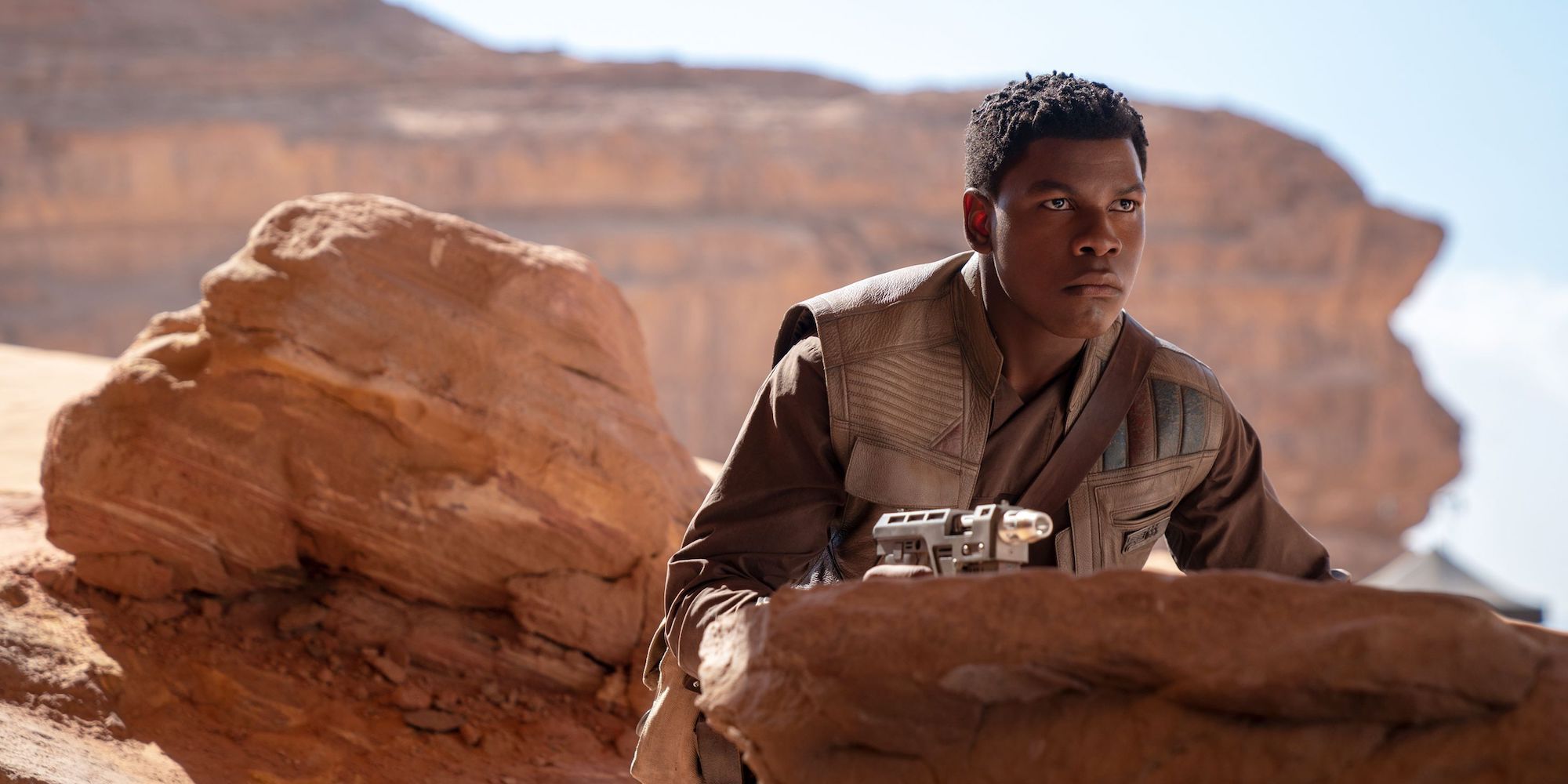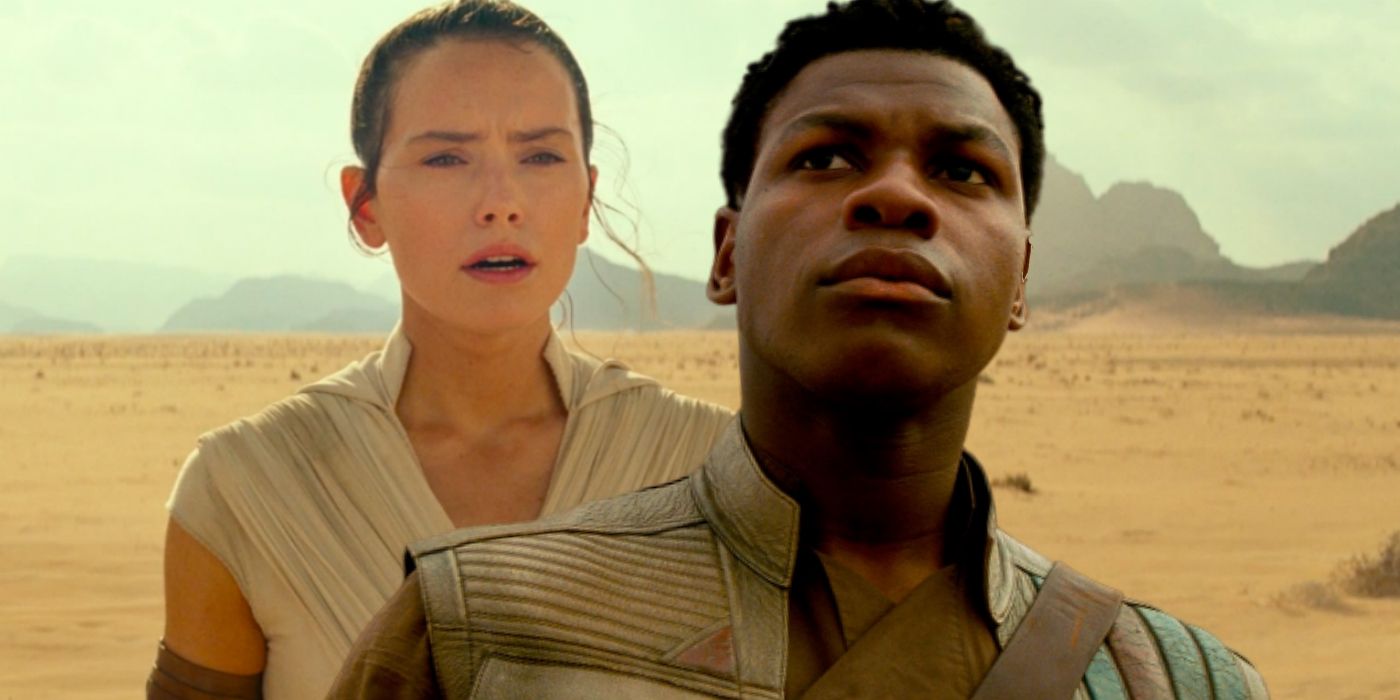Actor John Boyega has been openly critical of the treatment of Finn in Disney's Star Wars trilogy, and rightly so. In a candid and unfiltered interview, Boyega did not hide his displeasure over the treatment of his character, Finn, in the sequels. The trio of films, largely responsible for the resurrection of the once-fading franchise, has been met with vocal criticism for its story, often neglecting important and would-be groundbreaking characters. And according to Boyega, Finn is chief among them.
Notably, the conversation from Boyega surrounding Finn's treatment in Star Wars comes at a moment in history steeped in social unrest and great frustrations that go far beyond the current world-altering pandemic. Following the recent deaths and acts of violence perpetrated against George Floyd and countless others, the Black Lives Matter movement has continued to illuminate great inequities across the world and nation - and the House of Mouse, apparently, is no exception. Speaking of the fan-backlash at the time of his initial casting as Finn, Boyega states, "Nobody else in the cast had people saying they were going to boycott the movie because [they were in it]. Nobody else had the uproar and death threats sent to their Instagram DMs and social media, saying, ‘Black this and black that and you shouldn’t be a Stormtrooper.’ Nobody else had that experience. But yet people are surprised that I’m this way. That’s my frustration.” Boyega's feelings surely intensified as his character's proceeding plots became increasingly unfocused and without as much narrative heft as one might like, effectively underserving both Finn and the actor who plays him.
The watering down and ultimate failure of the Finn character, so thoughtfully and heartily played by Boyega, ultimately rests with Disney's reluctance to give as much screen time and attention to the more diverse characters which make up its extensive catalogue of franchises - the hullabaloo surrounding The Beauty and the Beast remake's first openly gay character turned out to be nothing but a short, unimportant development crammed comically in the film's final seconds, as was Star Wars: The Rise of Skywalker's first same-sex kiss (utilizing two ancillary and ultimately forgettable characters), which could be categorized as something approaching lip-service. However, it is Finn who has the most amount of potential squandered by a trilogy that seems so uncertain of what to do with him.
The Force Awakens Teased A Greater Importance For Finn (Then Didn't Use Him)
Before he made his way to the silver screen, John Boyega's Finn was all over The Force Awakens' marketing materials, lightsaber in hand and a cool confidence that, for many, indicated an exciting and new direction for the beloved franchise. Positioning the character as one of the series' new trio of heroes (reminiscent of the original trinity of characters: Luke, Han, and Leia), the build-up and mystery surrounding Finn was palpable, particularly because Boyega's casting marked the first time a Black actor had been seen in such a prominent role since the series' origin. And, indeed, many elements of Finn's character make for an incredibly powerful in-universe story; the idea of a Force-using Stormtrooper is a compelling one. His strong ties to Rey and Poe - the other members of this particular trio - serve as strong connective tissue between the reboot's main characters. By all metrics, Finn's story should have been central to the plot of The Force Awakens.
And yet, the film sees for little follow-through for Finn. In the movie's second (and arguably, least successful) act, the plot is somewhat muddled by Finn's desire to leave Rey (where was the treasonous Stormtrooper planning to go?), which comes off as unmotivated and as a rather transparent device aiming to separate the two heroes. While he is seen wielding a lightsaber for the first time and his Force sensitivity is hinted at, there is little attention paid to it as the script opts to follow Rey's journey more closely. And to make matters worse, the character is incapacitated and shelved midway through the film's final act, completely abandoning him in limbo between installments, perhaps indicative of the creators' uncertainty for the character's future. Impressed by both the character and Boyega's performance, many fans were excited for what was to come for the character with his inevitable awakening. But Finn's struggle to find a successful foothold in the franchise was just beginning.
The Last Jedi Caused More Division With Finn
Perhaps there is no film in the entire Star Wars canon as polarizing as The Last Jedi. While many fans and critics saw the Rian Johnson led sequel as a welcome departure from the previously established Star Wars status quo, vociferous backlash dominating much of the discussion. Just as in Empire Strikes Back (also the second film in what was the original trilogy), the script of Last Jedi separates its main trio, allowing for moments of great introspection and growth before rejoining each other in the climactic finale. Finn's Last Jedi story is largely tied to a new character, Rose Tico (Kelly Marie Tran), a mechanic with the rebellion. The relationship was a different flavor in the Star Wars universe and, though one's milage may vary in regards to the plot specifics surrounding them, the chemistry between the actors was certainly welcome. Additionally, seeing a world of war profiteering through the eyes of two young people, devastatingly impacted by the resultant violence, rang with narrative potential.
However, as in The Force Awakens, Finn (and now Rose) becomes sidelined in favor of other plots, a fact exacerbated by the erasure of his entire The Last Jedi experience in the final Skywalker Saga installment. In fact, Finn's "big bad" Captain Phasma is killed off anticlimactically in the film, all-but-severing Finn's connection to his Stormtrooper past. Despite its potential to spring Finn into an exciting final stretch, much of the impact is softened due to the The Last Jedi's preoccupation with the Rey/Kylo relationship, even as the film lays ground for a concept involving a Force capable of manifesting itself in those outside of the Skywalker and Palpetine family trees. As Boyega says, "You knew what to do with these other people, but when it came to Kelly Marie Tran, when it came to John Boyega, you know f**k all."
Rise of Skywalker Wasted Two Great Finn Storylines
Another divisive entry in the Star Wars film universe, The Rise of Skywalker (with J.J. Abrams back at the helm for what Bodega characterizes as a "salvage job") drops several developments from The Last Jedi, proving disastrous for the Finn character. Perhaps the most egregious of these omissions centers around the complete abandonment of Rose, who is completely divorced for the film's proceedings, with Kelly Marie Tran having more screentime in The Rise of Skywalker's BTS documentary. This is a fact that comes with a bit of real-world ickiness when considering the harsh bullying against Tran in the wake of The Last Jedi; bullying largely racially motivated. In essence, the more-or-less deletion of Rose left Finn without any forward momentum, despite a few half-hearted attempts.
Without Rose to help bolster Finn's character arc, the film offers a few moments in which Finn attempts to tell Rey something. While no explicit conversation is had throughout the film's runtime, later interviews reveal that Finn was trying to tell Rey that he was, indeed, Force-sensitive. Yet, the very exclusion of any real in-universe resolution within the context of the film is ultimately a slight against the Finn character. A second potentially revelatory storyline revolves around a group of deserter Stormtroopers, led by Naomi Ackie's Jannah. Yet, despite that potential, the characters get little more than an introduction in the film and a meeting that should be so reflective and crucial Finn's character arc is woefully downplayed and sidelined. With so much of the script dedicated to the Skywalkers and Palpatines, little room was left for what could have been a more compelling and new story.
What Finn's Story In Disney's Sequel Trilogy Should've Been
There are many points throughout the series in which Finn could have been treated with more care and respect, but much of that revolves around the most recent trilogy's seeming desire to tie itself to the larger franchise's past. Tropes and villains are ultimately borrowed from earlier Star Wars entries, despite The Force Awakens' tantalizing hints at a series headed for a bolder and fresher direction. Despite Boyega's own misgivings regarding The Last Jedi, the expansion of what's known of the Force and who has access to it could have helped to sell the intended reveal that he has been Force-sensitive all along, thus making its inclusion in the series less puzzling.
In addition to the aforementioned exclusion of Rose, the final film spends much of its time undoing the previous film and reestablishing the long-dead Palpatine as the primary antagonist, taking valuable material from Finn, Boyega, and an assortment of other non-Rey and non-Kylo characters. And finding the time for a story surrounding a Black Stormtrooper touched by the Force and finding his individuality and strength to rise up against an oppressive and unjust regime would have made for a far more effective story, in-universe and out.
Boyega is certainly justified in his frustration for a series which ultimately underserved his character, despite the promise of such a unique voice and perspective infiltrating what had been a rather homogenous character lineup. But, unfortunately, when large studios choose to resuscitate largely inactive franchises, there is a risk of inheriting some remnants of that franchise's past like Star Wars, including it's wishy washy narrative treatment for new and mold-breaking characters. While from outward appearances, Disney is attempting to include more diverse characters into its many properties, they must be careful to not let the ticking of boxes override the need to responsibly and respectfully tell their stories.
Finn Destroyed The First Order & The Empire In Rise Of Skywalker

